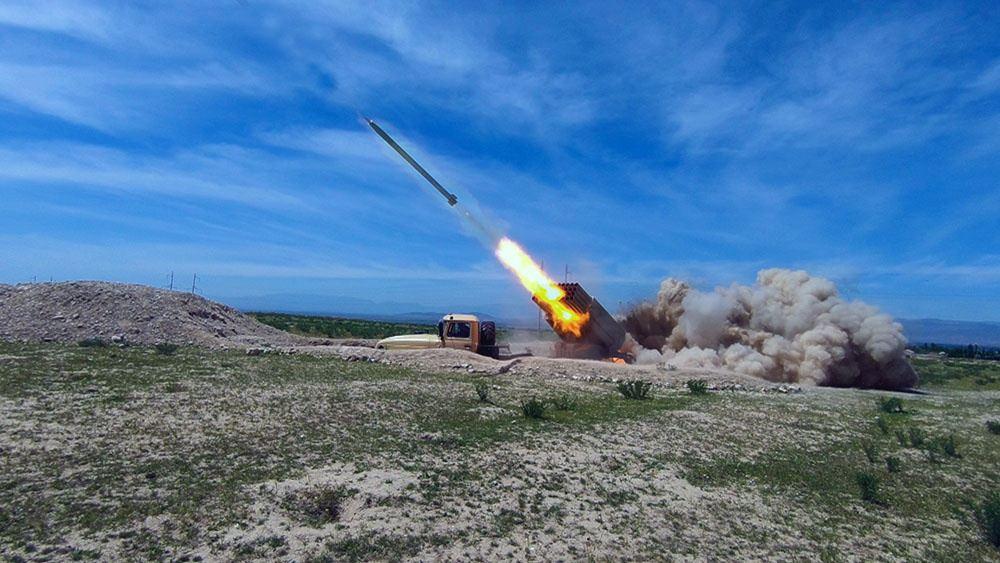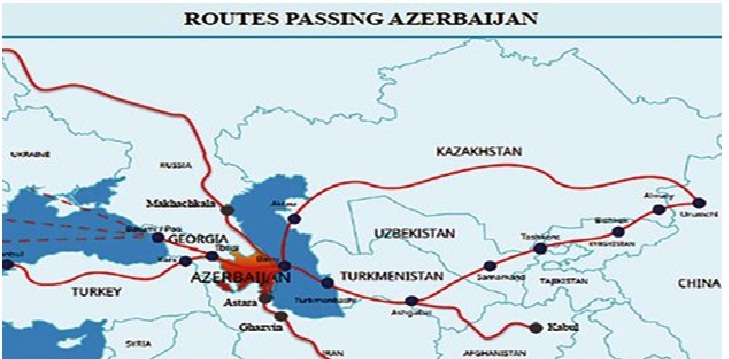by Syed Suhail Yaqoob
The crisis between Armenia-Azerbaijan is a global conflict localised. If it is not global, it will become over time localised as the global powers will settle their scores here.
The world is rightly concerned about the ongoing Armenia-Azerbaijan war. Hundreds are killed, many more injured, and millions were displaced and counting.

The two countries are fighting for Nagorno-Karabakh region which has a huge strategic and geographical significance. The conflict can be traced to the USSR period when it was a global superpower. Under Russia’s influence, the two nations were among the countries that formed the USSR block. However, after the fall of USSR, there was a war between Armenia and Azerbaijan for the control over the Nagorno-Karabakh region.
What is Nagorno-Karabakh?
Straddling western Asia and Eastern Europe, the region is internationally recognised as part of Azerbaijan. However, most of the area is controlled by Armenian separatists although it is recognised as the part of Azerbaijan territory since the Soviet era. When the Soviet Union began to collapse, Armenian parliament illegally voted for the region’s transfer to their country. The Soviet authorities, however, turned down the Armenian demand. The region although, recognised as the part of Azerbaijan, is today governed by separatist Armenians who have declared it a republic called Nagorno-Karabakh Autonomous Oblast. The “republic” is not recognised and also Armenian government doesn’t recognise the region as a republic or an autonomous region.

The Armenian government, however, supports the region both politically and militarily. After the Armenian separatists took over the area illegally the region has seen many skirmishes and exchange of fire over the years even after the 1994 peace deal.
In 2016, there was a Four-Day War between these countries before Russia mediated the peace deal. The Organisation for Security and Co-operation in Europe (OSCE) Minsk Group tried to get the two countries to reach a peace agreement for several years. The group is chaired by France, Russia and the USA. All these efforts seem to have failed as the war has erupted once again on September 27. Both the nations have declared martial law and now more than 100 people are dead.
Why War?
The two South Caucasus countries have been in conflict since 1988 when Armenia made territorial claims against Azerbaijan. Eventually, Armenian armed forces occupied 20 per cent of Azerbaijan, including the Nagorno-Karabakh region and seven surrounding districts.
Peace negotiations followed by a ceasefire in 1994. However, Armenia has not yet implemented any of the four UN Security Council resolutions on the withdrawal of its armed forces from Nagorno Karabakh and the surrounding districts.
However, many theories are in the market as to why the two nations have started the war this time. Some believe that it is a localised ethnic conflict between Armenians and Azeri’s. Others assume that it many a way to divert attention from declining economic growth in the region. Some commentators even believe that Azerbaijan wants to protect its core infrastructure – the gas pipeline that passes through the area.
The war is always used as a way to deflect public opinion. The commentators have analysed this crisis through the economic crisis in Armenia and Azerbaijan. The Covid-19 crisis has hit both these countries and there is an expected decline in economic growth. The World Bank has cut its 2020 economic growth forecasts for both Armenia and Azerbaijan due to Coronavirus.
The economy for Armenia and Azerbaijan is expected to shrink by 2.8 per cent and 2.6 per cent, respectively. The unemployment level for Armenia has been 17 per cent in 2020 whereas for Azerbaijan the unemployment levels although just around 6 per cent is expected to increase due to the decline in economic growth.
The Asian Development Bank has also cut its growth forecast for Azerbaijan to 0.5 per cent in 2020 from its previous projection of 2.4 per cent in 2019. According to certain estimates, Azerbaijan is losing around 80 million dollars per day due to Covid-19 triggered confinement measures.
Moreover, the country has been severely affected by the decline in global oil prices. The Oil and natural gas sectors make up 39 per cent of its Gross Domestic Product. It is thus highly essential for the country to protect its oil and gas infrastructure. Most of the Oil infrastructure of Azerbaijan passes close to this contested region. For the country the area hosts energy and transport lines such as Baku-Tbilisi-Kars railway connecting Asia and Europe, called ‘Iron Silk Road”, the Baku-Tbilisi-Ceyhan oil Pipeline and Azerbaijan’s South Caucasus Pipeline channelling natural gas to the TAP and TANAP supplying Europe with alternative energy resources. Some oil pipelines are just 16 km away from the Armenian borders. Azerbaijan can be expected to protect its oil infrastructure which is highly important for its survival.
A global conflict Localised?
The economic crisis for both countries may be a reason to go for a small conflict to divert public opinion. However, there is an important concern regarding the war between Armenia and Azerbaijan. Many people see the ongoing war between the two countries as a ‘global confrontation localised’.
The political commentators are clear about one thing – the wars between big and powerful countries will either be localised or fought far away from the countries.
Over the years the world has seen assertive China carving out its place in the world. It is now considered the heir to the USA as a sole global power. China military, economy and technology has rapidly increased. However, the few European countries including the USA were trying to destabilise it through both covert and overt operations. Although the USA and other countries tried to checkmate China using India as a frontline warrior they have not succeeded. India as a country has not been effective due to declining economic growth, communalism and faulty administrative apparatus.
Destabilising China?
These countries now may have selected the Nagorno-Karabakh region to destabilise China. The region has great strategic significance. The ambitious One-Road Belt of China passes through Azerbaijan and is close to the disputed region. Moreover, Azerbaijan is considered as a ‘Middle corridor country’. A just look at the map shows that the country is so much significant for China as all roads pass through Azerbaijan. In fact, the country is the first to support One Road initiative of China.

The country is like a junction of roads.
No wonder China has invested highly in the country. The bilateral trade between China and Azerbaijan has reached $1.29 billion, an increase of 43 per cent since 2016. In 2017, China was the fourth-largest trading partner with Azerbaijan and this ranking is likely to be moving up under the Belt and Road initiative.
The countries may be targeting the One-Belt Road initiative which is China flagship project to gain influence in the oil and gas-rich Central Asian countries. If this is the conflict generated by the global powers to contain the influence of China, the war will go for over a longer period of time.
Turkey’s Stakes
The conflict has gained worldwide attention because of the involvement of regional rivals – Turkey and Russia. Turkey has openly backed Azerbaijan and condemned the actions of Armenia which is illegally occupied the region that belongs to Azerbaijan. Over the past years, Turkey has been presenting itself as the leader of the Muslim world. It has openly supported Kashmir and Palestine thus creating sympathy across the Muslim world. Assertive Turkey has however placed itself in direct confrontation with Russia and Saudi Arabia. The open support of Turkey to Azerbaijan may be an attempt to contain the influence of Russia in the region. Turkey and Russia are also at the opposite side in a war in Syria. However, Russia has been almost quite given its good relationship with both Armenia and Azerbaijan. Interestingly, both countries use Russian arms and ammunition against each other. Russia’s involvement will increase the risk of NATO’s involvement in the region.

Although Armenia has alleged that Turkey has shot down its fighter plane, Russia has avoided commenting on it which signals that the country doesn’t want NATO’s intervention. Turkey is a member of NATO while Armenia is a member of the CETO (Collective Security Treaty Organisation)

Turkey’s support for Azerbaijan has also important ramifications for Saudi Arabia. Saudi Arabia considers itself, by default, the leader of the Muslim world because the two most important and holiest places are in the country. Turkey has, however, taken a lead in the Armenia-Azerbaijan war, which will place Saudi Arabia in a precarious position. The country has openly supported Azerbaijan. The leadership of the Muslim world is hanging between Turkey and Saudi Arabia. The winner will be determined by who will better manage the crisis between Christian Armenians and the Muslims in Azerbaijan.
Post Script
The crisis between Armenia-Azerbaijan is a global conflict localised. If it is not global, it will become over time localised as the global powers will settle their scores here. The most important to be seen will be the impact on the ‘One Belt and One Road initiative’ and ‘who will emerge as the potential leader of the Muslim world.
(Syed Suhail Yaqoob is teaching economics at Cluster University Srinagar. The opinions expressed in this article are those of the author’s and do not purport to reflect the opinions or views of Kashmir Life.)















